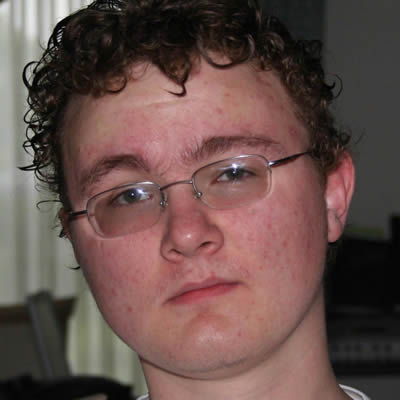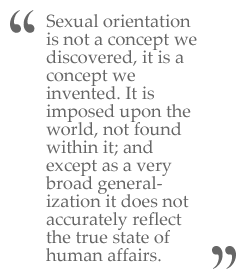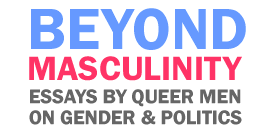 
Patrick Julius
|
By Patrick Julius
Patrick Julius is 20 years old, finishing his second year studying Brain, Behavior, and Cognitive Science at the University of Michigan in Ann Arbor. Patrick writes for Beyond Masculinity wearing the label of “bisexual” (fairly accurate, yet incomplete, as his essay will describe), which he also wears on coming-out panels for the Speaker’s Bureau of the University of Michigan Spectrum Center. He knows four languages (English, Latin, Arabic, and some Japanese), has written a book on special relativity, and is currently working on an invention that provides cardiovascular exercise and reduces carbon dioxide emissions at the same time. |
|
 And to complicate matters further, there remains a
question of whether sexual orientation is constant
throughout one’s life—or even from day to day. I
honestly don’t know; the answer might actually depend
what you mean by the words “sexual orientation.” My own
intuition is that there is some underlying core
orientation that stays largely constant, but that the
specifics can be significantly modulated by moods and
experiences day to day and year to year. Was I gayer
this morning than last Thursday, or did it just feel
that way? What if I was gayer for visual stimuli and
straighter for smells? I can’t say for sure, and I
really don’t know how one would even go about finding
out—or if it really matters anyway. And to complicate matters further, there remains a
question of whether sexual orientation is constant
throughout one’s life—or even from day to day. I
honestly don’t know; the answer might actually depend
what you mean by the words “sexual orientation.” My own
intuition is that there is some underlying core
orientation that stays largely constant, but that the
specifics can be significantly modulated by moods and
experiences day to day and year to year. Was I gayer
this morning than last Thursday, or did it just feel
that way? What if I was gayer for visual stimuli and
straighter for smells? I can’t say for sure, and I
really don’t know how one would even go about finding
out—or if it really matters anyway.
I belie all of this complexity when I label myself
“bisexual;” this I do mostly for my own convenience.
Rather than pulling out a brochure for the Klein
continuum and delivering an hour-long lecture explaining
my own multidimensional sexuality, it’s easier for me to
simply use a pre-existing label and present an image of
someone who doesn’t particularly care about the sex or
gender of my partner. I can always explain the specifics
later if it happens to come up. In the same way, I’m
sure it’s easier for a mostly homoerotic and
heteroromantic young man who is presently just looking
for sex to say that he is “gay” so it’s clear what sort
of person he’s interested in right now. If such a man
grows up and marries a woman, has that man sold out? Is
he closeted? Maybe not; maybe the only thing that has
changed is the particular face of his identity that is
most salient in his life. Or maybe these things really
can change at a deeper level, but the ways they change
remain mysterious to us.
In any case, it’s nowhere near as simple as we make it
out to be. Nor should we expect it to be! Part of
the problem is that we are bothering to taxonomizeour sexuality in the first place. There are no
psychologists charting out the percentage of people who
prefer broccoli to asparagus, no pastors decrying the
sinfulness of enjoying chocolate rather than vanilla. I
have little doubt that these preferences are equally
complicated as sexual orientation (broccoli goes better
with stir-fry, but what about barbecued in tin-foil?
Normally I like chocolate, but the other day, vanilla
really hit the spot), but we simply don’t bother to
categorize people that way. We don’t even do the same
thing in other kinds of sexual preference: there isn’t a
word for someone who prefers blondes to brunettes, and
there aren’t political organizations dedicated to
destroying or upholding the rights of foot-fetishists.
For some reason, we see sexual orientation differently;
grand institutions have been built around defining
vaginal sex between one male and one female as the only
acceptable sort of sexual behavior and all other sorts
of sex as not merely distinct, but so much so that one
is good, holy, even obligatory and the other is evil,
degenerate, even unforgivable. Even if we grant them
roughly equal ethical status (as most LGBT people and
allies probably would), we still tend to see some
profound distinction between these two kinds of sex, and
by analogy between the sorts of people who choose to
engage in them. Speaking as a biological scientist, this
is not a completely arbitrary distinction to
make—obviously, male-female vaginal sex is the only kind
of sex that ever produces children, and there are
epidemiological differences as well—but it distorts and
oversimplifies the issue immensely, elevating real but
minor differences to absolute categories.
 Ultimately, I think this is why it is so difficult to
pin down a simple, accurate, measurable concept of
sexual orientation: sexual orientation is not a concept
we discovered, it is a concept we invented. It is
imposed upon the world, not found within it; and except
as a very broad generalization it does not accurately
reflect the true state of human affairs. Maybe it is a
convenient notion for certain circumstances (in a gay
bar, I can expect to find men who are interested in men,
at least in that particular context, at that particular
moment in their lives); but we must be willing to
abandon our convenient notions when they become
oppressive. Ultimately, I think this is why it is so difficult to
pin down a simple, accurate, measurable concept of
sexual orientation: sexual orientation is not a concept
we discovered, it is a concept we invented. It is
imposed upon the world, not found within it; and except
as a very broad generalization it does not accurately
reflect the true state of human affairs. Maybe it is a
convenient notion for certain circumstances (in a gay
bar, I can expect to find men who are interested in men,
at least in that particular context, at that particular
moment in their lives); but we must be willing to
abandon our convenient notions when they become
oppressive.
So yes, I call myself “bisexual.” It’s easier, quicker
this way; there is a little pink-purple-blue flag I can
wear (that at least most LGBT people seem to recognize,
though straights are typically befuddled); I have
something to say when someone asks whether I like men or
women. I have an identity label I can use when I speak
on coming-out panels. And yes, I do all this even though
my sexuality is vastly more complicated than the label
makes it sound, so much so that indeed I’d probably fail
a plethysmograph.
|




6 COMMENTS ON THIS ESSAY:
It bothers me that Patrick takes on the title of "bisexual", particularly because of my own struggles with these same experiences.
I am an 18-year-old male, that for 7 years has been predominantly sexually attracted to males, while still having a powerful sexual attraction to the single woman I have identified to be as the love of my life.
My experience has been that while thinking of myself as "gay" was the title that made the most sense (to me) it was still partly inaccurate. For society, which observed my growing 3 and a half year relationship with my girlfriend, and my physical dynamics with her, it was assumed that I "must be BI". This category bothered me even more, because I have never, aside from my girlfriend, been able to identify a woman who could consistently give me an erection.
Furthermore, there are even some (specifically my family) who continue to categorize me as "straight", and discard any displays of affection I may have towards men as "temporary confusion".
The bottom line is that I do not feel ANYONE has the right to force me under the umbrella of any of these three categories. I am NOT gay, NOT straight, and NOT bisexual... and though at times it may be simpler to tell people I'm gay to justify my behaviors and to offset the courting from other women, to say I am "GAY" is to lie about who I really am.
I see myself as QUEER (i.e. UNCONVENTIONAL)
I am a straight woman who finds the idea of bisexuality or ambiguous sexuality in men, frankly, horrifying and threatening on a very visceral level. Articles like this have been crucially important to challenging that reaction, by helping me understand the extent to which forced binary sexuality limits the possibilities in all relationships, and I really appreciate Patrick's honesty and candor.
I also think its important to discuss the degree to which life experience would also seemingly dictate the descriptors one would use to define their own sexuality, i.e. whether or not you happen to meet the one woman or man (or 2 or 10) who can give you an erection/whom you fall in love with (I realize the terms man and woman are also generalizing, but since thats sort of the premise of the essay, bare with me). I think there should be more discussion regarding the fact that often times in life "orientation" depends a lot on the specific person/s (rather than necessarily pornography) that we find ourselves attracted to, a concept which I think of as even more disturbing and beautiful.
I really enjoyed this essay and Patrick's honesty. It was very helpful in my understanding complexities that exist within sexualities. I have always easily and comfortably fit into the identities of homoerotic attraction, but bringing in the other realms of romance and platonic orientations has really got my mind turning. Thanks for the insightful and provocative analysis!!
"is currently working on an invention that provides cardiovascular exercise and reduces carbon dioxide emissions at the same time."
sorry man, someone already invented that. it's called the bicycle.
This is a really great essay. It is really close to my own experiences. Thanks for letting the B's of LGBT know that we are not the only ones who are a bit 'queer'
This is the sort of stuff that should be taught in sex-ed classes! I wish more people understood the world this way - it always seemed like such an obvious truth to me, and yet most people I know are so stuck in the "gay / straight" world (often even denying the existence of bisexuality or anything like it). This writer's character is so ridiculously me, I'm wondering if I have a long-lost twin I was never told about! :P